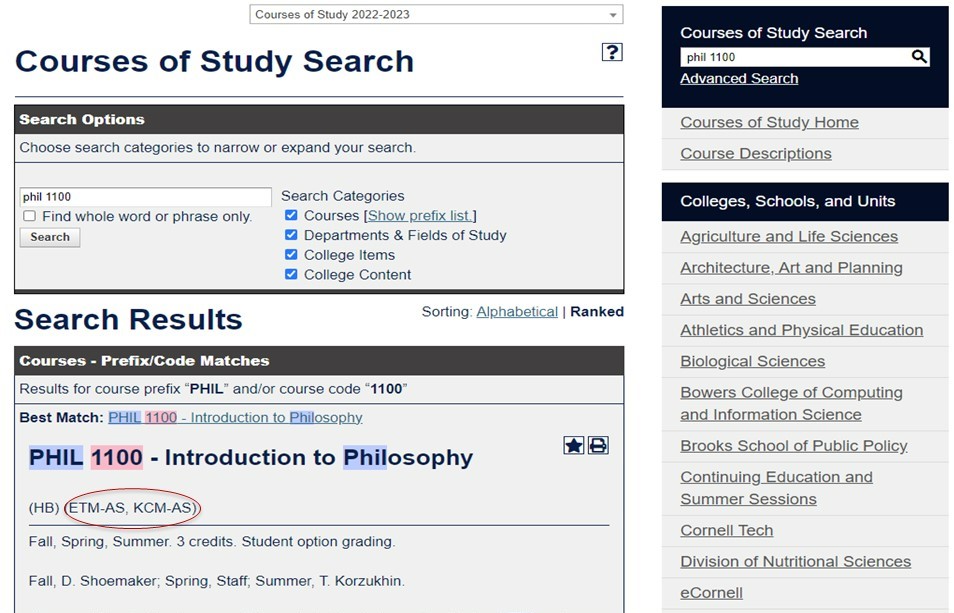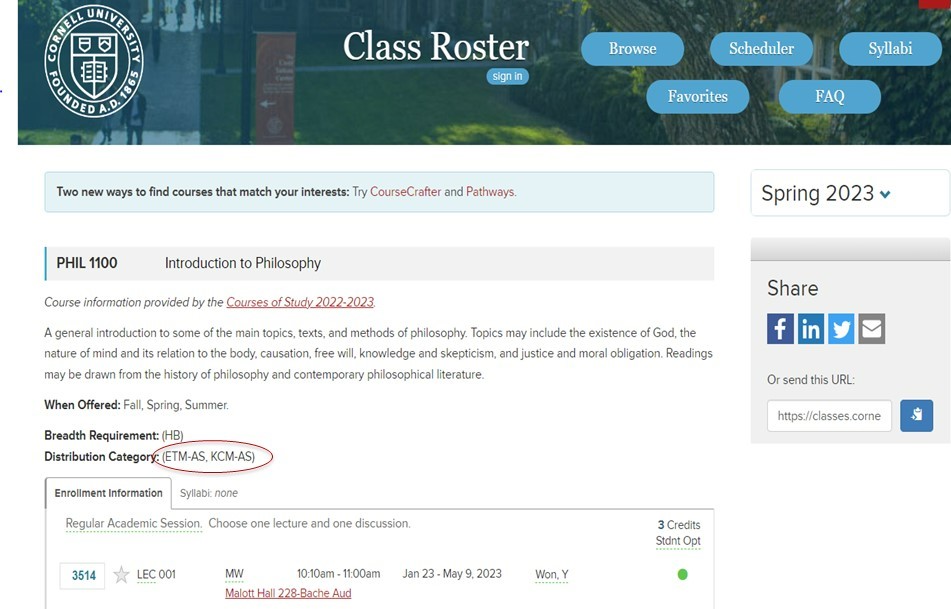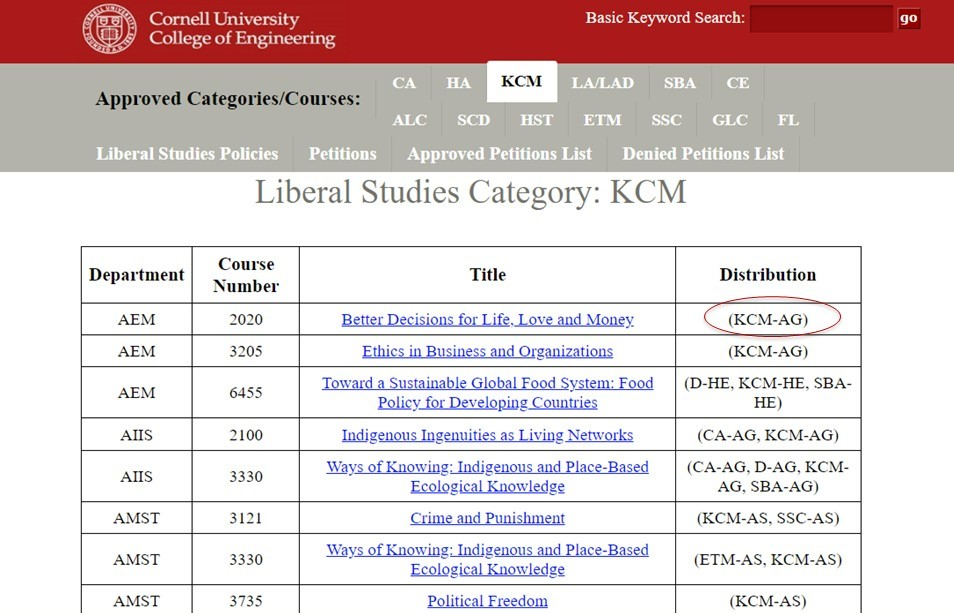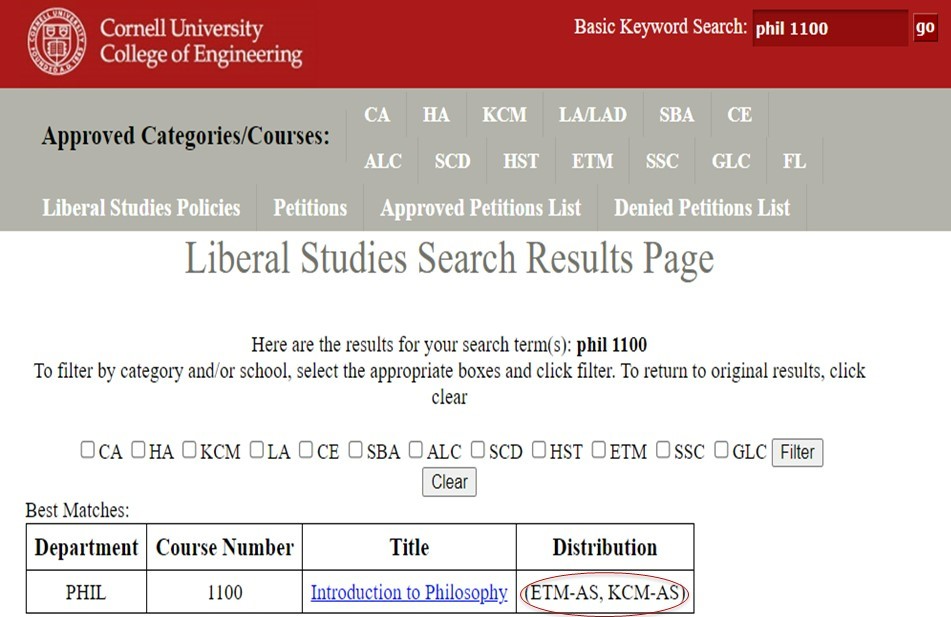Page Contents
- Liberal Studies Degree Requirements for Students
- Examples of Learning Outcomes that Characterize Liberal Arts
- How to Find Courses that are Approved for Liberal Studies for Engineers
- Courses Not Approved for Liberal Studies for Engineers
- How to Petition for a Liberal Studies Course Not Already Approved or Denied
Liberal Studies Degree Requirements for Students
Examples of Learning Outcomes that Characterize Liberal Arts
- Understanding human life in cultural contexts through interpretive analysis of individual behavior, discourse, and social practice. (CA)
- Ability to interpret continuities and changes – political, social, economic, diplomatic, religious, intellectual, artistic, and scientific – through time. (HA)
- Appreciation of literature and the arts through critical study of art and its history, aesthetics, and theory. (LA/LAD)
- Understanding the bases of human knowledge and decision-making, ranging from cognitive processes, to abstract reasoning, to the ability to form and justify moral decisions (e.g., cognitive psychology, linguistics, philosophy, ethics). (KCM)
- Recognition of human life in its social context through the use of social-scientific methods, with topics ranging from attitudes of individuals to interpersonal and broad societal relationships. This includes understanding the challenges of building a diverse society, and/or examining the various processes that marginalize people and produce unequal power relations. (SBA)
- Understanding of diverse cultures through the study of foreign languages. (FL)
How to Find Courses that are Approved for Liberal Studies for Engineers
The Liberal Arts commonly include courses in the humanities (e.g., history, art history and criticism, literary studies and writing, classics, philosophy, religious studies), foreign languages, and the social sciences (e.g., sociology, anthropology, economics, political science, psychology), as well as interdisciplinary courses involving these disciplines (e.g., area studies, women’s studies). Performance arts are also considered liberal arts and include theatre, dance, instruction in musical theory and/or musical performance (non-PE).
Students can find approved liberal studies courses in the following ways (Note: If you enroll in a course that does not have an approved liberal studies category designation, but the course is cross-listed and/or combined with a course that does have an approved liberal studies category designation, then the course without the designation will also be approved for liberal stuides credit in the same categories as the cross-listed/combined course):
Courses of Study
Search for a particular course that you have in mind and view its description in the online Courses of Study to see if a liberal studies distribution category exists (CA, LA/LAD, ALC, SCD, HA, HST, KCM, ETM, SBA, SSC, GLC, FL, CE). The course must have one or more of these categories to count for liberal studies for engineers.

Courses of Study Search image long description
Class Roster
Search for a particular course that you have in mind and view its course description via the “view course details” tab in the Class Roster to see if a liberal studies distribution category exists (CA, LA/LAD, ALC, SCD, HA, HST, KCM, ETM, SBA, SSC, GLC, FL, CE). The course must have one or more of these categories to count for liberal studies for engineers.

Class Roster image long description
Approved Courses List
Search for hundreds of courses with approved distribution categories. You can click in each of the gray category tabs (CA, LA/LAD, ALC, SCD, HA, HST, KCM, ETM, SBA, SSC, GLC, FL, CE) in the “Approved Categories/Courses” section at the top of our Liberal Studies database to view lists of courses approved for a specific category.
Or, click in the search bar at the top right of our Liberal Studies database to conduct a keyword search for particular classes.

Liberal Studies Category image long description

Liberal Studies Search Results Page image long description
Approved Petitions List
Check Cornell Engineering’s Approved Petitions List for additional course options from classes successfully petitioned in the past. Pay close attention to the “Notes” column for additional course information.
Courses Not Approved for Liberal Studies for Engineers
Courses generally not considered Liberal Arts include those in athletics, business (including accounting, finance, marketing, management, and entrepreneurship), methods of practice of education, and engineering (including project teams and research involvement). Many of these courses belong rather to a “professional curriculum” covering specific methods and practicums or are largely technical in nature. However, Liberal Arts do include a subset of courses in business taught from a humanities or social science perspective (e.g., sociology of business, history of business, and business ethics).
Check Cornell Engineering’s Denied Petitions List for courses that were petitioned in the past but were denied. These courses cannot count toward the liberal studies requirement.
How to Petition for a Liberal Studies Course Not Already Approved or Denied
Cornell Engineering recommends students enroll in courses identified as fulfilling the liberal studies categories as listed in the current Courses of Study. However, students may petition additional courses not identified and not already denied by Cornell Engineering on the Denied Petitions List. For more information on petition policies and to determine if a course may be petitioned, please refer to the Liberal Studies Petitions page.
Note: For an overview of the information on this page and Cornell Engineering’s liberal studies requirement, you can also listen to a recording of a Liberal Studies Information Session presented by the Engineering Advising Office.
Image Long Descriptions
Courses of Study Search Interface: Image Long Description
This screenshot shows the Cornell University Courses of Study Search interface with search results for “phil 1100.”
At the top, a search bar labeled “Courses of Study Search” includes an entry field where “phil 1100” is typed. Below, a section titled “Search Options” allows users to refine searches by selecting categories such as Courses, Departments & Fields of Study, College Items, and College Content. The “Search” button is located beneath these options.
The “Search Results” section presents the best match:
- Course: PHIL 1100 – Introduction to Philosophy
- Distribution Categories: ETM-AS, KCM-AS (circled in red)
- Availability: Fall, Spring, Summer
- Credits: 3
- Grading: Student option grading
- Instructors: Fall – D. Shoemaker; Spring, Summer – T. Korzukhin
On the right side, a vertical menu contains links to:
- Advanced Search
- Courses of Study Home
- Course Descriptions
Another section, “Colleges, Schools, and Units,” lists links to different colleges, including:
- Agriculture and Life Sciences
- Architecture, Art and Planning
- Arts and Sciences
- Biological Sciences
- Bowers College of Computing and Information Science
- Brooks School of Public Policy
- And more
This page helps students explore course offerings and their distribution categories.
Class Roster: Image Long Description
This screenshot shows the Cornell University Class Roster webpage for PHIL 1100 – Introduction to Philosophy. The header includes the Cornell University seal, the page title “Class Roster,” and navigation buttons for Browse, Scheduler, Syllabi, Favorites, and FAQ.
Below the header, there is an announcement suggesting two new ways to find courses that match your interests through CourseCrafter and Pathways.
The main content section provides course details:
- Course title: PHIL 1100 – Introduction to Philosophy
- Source: Course information from the Courses of Study 2022-2023
- Description: A general introduction to philosophy, covering major topics, texts, and methods. Topics may include the existence of God, the nature of the mind and its relationship to the body, causation, free will, knowledge, skepticism, justice, and moral obligation. Readings may come from historical and contemporary philosophical literature.
- When offered: Fall, Spring, Summer
- Breadth requirement: HB
- Distribution category: ETM-AS, KCM-AS (circled in red)
The enrollment information section lists course scheduling details:
- Session type: Regular Academic Session
- Lecture section: 3514 (LEC 001)
- Days and time: Monday and Wednesday, 10:10 AM – 11:00 AM
- Dates: January 23 – May 9, 2023
- Location: Malott Hall 228-Bache Auditorium
- Credits: 3
- Grading: Student option
On the right side, a dropdown menu allows students to select different semesters, showing Spring 2023 in this view. Below that, a share section contains icons for sharing via Facebook, LinkedIn, Twitter, and email, along with a URL field for copying the course link.
This page helps students review course details, schedule options, and academic requirements.
Liberal Studies Category: Image Long Description
The image is a screenshot of a webpage from Cornell University College of Engineering, displaying a table of approved Liberal Studies courses under the KCM (Knowledge, Cognition, and Moral Reasoning) category. The webpage has a red header with the university’s logo on the left, and a Basic Keyword Search bar with a red search button labeled “go” on the right.
Below the header, there is a navigation menu with gray buttons containing white text. The selected tab, “KCM,” is highlighted in white with black text. Other visible categories include CA, HA, ALC, SCD, HST, ETM, SSC, GLC, FL, LA/LAD, and SBA. Below this, three additional menu links appear in white text: Liberal Studies Policies, Petitions, Approved Petitions List, and Denied Petitions List.
The main content area of the webpage has the heading “Liberal Studies Category: KCM,” followed by a table listing courses that fulfill this requirement. The table has four columns:
- Department – The department offering the course (e.g., AEM, AIIS, AMST).
- Course Number – The unique identifier for the course (e.g., 2020, 3205, 6455).
- Title – The name of the course (some are hyperlinks).
- Distribution – The liberal studies categories the course fulfills (e.g., “KCM-AG,” “D-HE, KCM-HE, SBA-HE”).
Each row in the table represents a course. Some courses fall under multiple liberal studies categories. The first course, “Better Decisions for Life, Love and Money” (AEM 2020), has its distribution category circled in red, showing “(KCM-AG)”.
Examples of other courses listed include:
- “Ethics in Business and Organizations” (AEM 3205) – KCM-AG
- “Toward a Sustainable Global Food System: Food Policy for Developing Countries” (AEM 6455) – D-HE, KCM-HE, SBA-HE
- “Indigenous Ingenuitites as Living Networks” (AIIS 2100) – CA-AG, KCM-AG
- “Crime and Punishment” (AMST 3121) – KCM-AS, SSC-AS
Some course titles are hyperlinked, presumably leading to more detailed descriptions.
Liberal Studies Search Results Page: Image Long Description
This is a screenshot of the Cornell University College of Engineering’s Liberal Studies Search Results Page. The page provides a tool for searching approved liberal studies courses.
The top of the page includes a red header with the university’s name and a basic keyword search box, where “phil 1100” has been entered.
A navigation menu follows, containing links to:
- Liberal Studies Policies
- Petitions
- Approved Petitions List
- Denied Petitions List
A filtering section allows users to refine their search by selecting checkboxes for different categories, such as CA, HA, KCM, LA, CE, SBA, ALC, SCD, HST, ETM, SSC, and GLC. Two buttons labeled “Filter” and “Clear” provide options to apply or reset filters.
The search results display one course that matches the keyword:
- Department: PHIL
- Course Number: 1100
- Title: Introduction to Philosophy (linked)
- Distribution Categories: ETM-AS, KCM-AS (these categories are circled in red in the image)
This page helps students identify liberal studies courses that meet specific distribution requirements.
